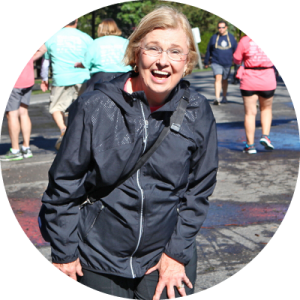
Vivian
My husband and I realized, from the time our daughter was two years old, that we couldn’t deviate from her schedule. She had anxiety and OCD—that expression hadn’t even been coined yet—and, later, bi-polar.
Mary Katherine was 37 when she committed suicide. She just got tired, she gave up. I think I would have given up, too, if I’d been in her shoes. We had fought it. By the time she was in sixth grade, we were seeing the school psychologist; and we went to the Wilson County Mental Health Department; and there wasn’t hardly a doctor in Raleigh, Durham or Chapel Hill who was able to help us.
It’s still a taboo subject. A lot of families don’t want to talk about it. But if one out of five suffers from some form of it, that’s almost as much as all the other illnesses put together.
Nobody chooses to be mentally ill. If I can help someone—families, people suffering—if I can make a difference in somebody else’s life, I would like to do so.
The Walk for Hope helps me show that I have confidence that research will help people who are presently mentally ill and also those in the future. I feel like each person who makes a contribution is helping even if they can’t walk. And the fact that 100% of the money we raise goes straight to research at UNC-Chapel Hill, that’s a positive. How many other organizations can say that?
It just makes me feel so warm when people make a donation, because the mentally ill are truly the forgotten.
Will You Join Us?
Walk for treatment. Walk for life. Walk for Hope.
Sign up to receive updates on our annual event, as well as the
Foundation of Hope. Follow our stories and see your impact.

